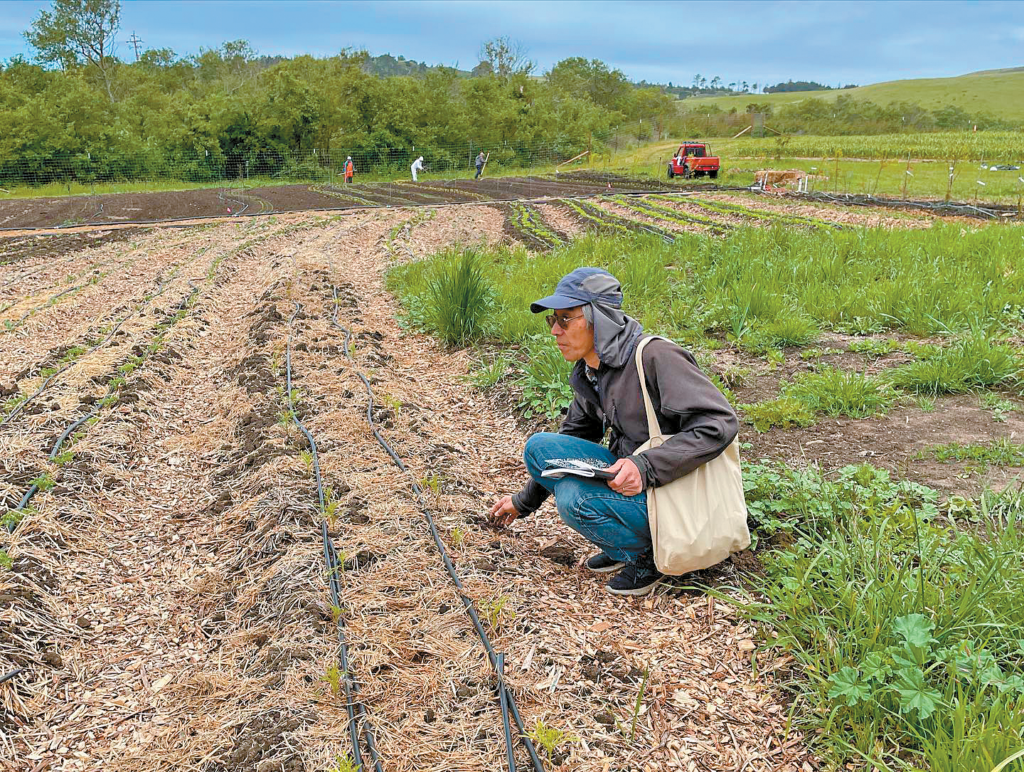Feb 14, 2024
Organic research receives boost in California
California leads the nation in organic agricultural production, accounting for more than $14 billion in organic sales and 36% of the U.S. organic market in 2021.
Yet research has lagged behind the exponential growth of organic farming in the state.
Now that trend may be changing, thanks to an increasing focus on supporting organic studies and information sharing.
In 2020, the University of California (UC) system opened the Organic Agriculture Institute to facilitate development of organic research and extension programs.
The institute’s launch came a year after UC-Santa Cruz elevated soil scientist and agroecologist Joji Muramoto as the state’s first UC Cooperative Extension organic production specialist. Muramuto has conducted extensive research on soil-borne disease management in organic vegetable production.

Darryl Wong, executive director for the UC Santa Cruz Center for Agroecology, said the center is working to connect farm-level findings of organic growers with the more specialized studies performed by academic researchers.
“Farmers do action research that starts with what happened in the field; epistemic research takes it to the question of how and why it happened,” Wong said. “To move organic forward, we need to balance these two research approaches.”
With organic studies drawing increasing funding interest, researchers and growers are looking to identify potential study areas that are best connected to day-to-day challenges of organic farming.
“Soil health, water and pest management are at the top in our preliminary survey of growers,” said Shriya Rangarajan, postdoctoral researcher at the UC Organic Agriculture Institute.
Rangarajan said many organic farmers have relied on getting information from other growers because of a lack of organic farm advisors and research.
The institute is attempting to coordinate the sources of information about organic agriculture scattered throughout the UC and Cooperative Extension systems and identify the most important knowledge gaps.
The institute was launched with an initial $500,000 endowment from Clif Bar & Co. and $500,000 in matching funds from the UC Office of the President. In 2022, the California Department of Food and Agriculture (CDFA) awarded $1.85 million to help the UC system increase technical assistance for organic farmers.
Without an established network of Cooperative Extension advisors with expertise in organic production, many growers had developed a knack for searching on their own for specialists to advise them, said Larry Jacobs, president and co-founder of Jacobs Farm del Cabo, a Santa Cruz-based organic producer.
“Find people who are knowledgeable, hook them in, support them, and don’t give up,” Jacobs suggested during a panel discussion in Monterey called “Understanding Evolving Production Challenges for Organic Growers.”
Rangarajan said economic realities can be particularly important for new or smaller organic farmers.
“Transitional growers have additional challenges accessing capital and markets,” Rangarajan said. “There is a consolidation on the buyer side, and that affects prices. We need to expand the scope of organic research to include ag economists and nutritionists.”
In 2020, the Organic Farming Research Foundation surveyed more than 1,100 certified organic and 71 transitioning-organic farmers and ranchers across North America about their production systems, soil-health management practices and pressing production challenges.
According to survey results published in 2022, 67% of organic growers identified controlling weeds as a prime challenge. Managing production costs was cited by 59%, and 48% said soil fertility and crop nutrition was a challenge.
Jacobs, who farms 400 acres of organic culinary herbs, stressed the importance of organic research and expertise.
At the Monterey panel session, he described working with a CDFA biological control unit to help solve a squash bug problem.
He said he found the answer to nematode management in tomatoes was a combination of using more tolerant varieties and rotating into mustard as a biofuel crop that also served as a biofumigant for the soil.
Jacobs’ organic research interests extend far beyond California’s borders. He has searched for experts who could help control fruit flies on organic hard squash in Tanzania.
He said organic growers face unique crop-production challenges because they rely on biological solutions, which don’t draw the same research attention and corporate funding for studies as do chemical formulas used in conventional agriculture.
“There are better biological solutions, but no one is making money off them, so nobody is pushing them,” Jacobs said. “Organic research has been a neglected tool for a long time, but that is starting to change.”
Bob Johnson is a reporter in Monterey County, California. He may be contacted at bjohn11135@gmail.com.






